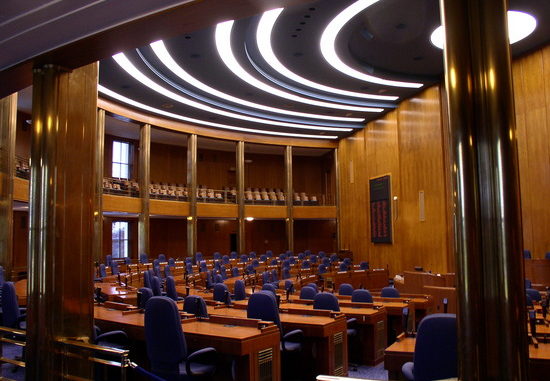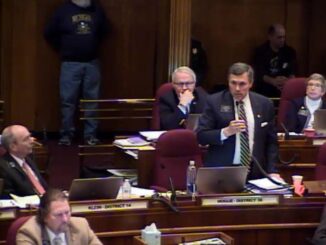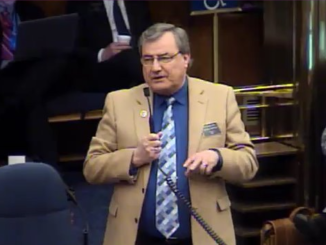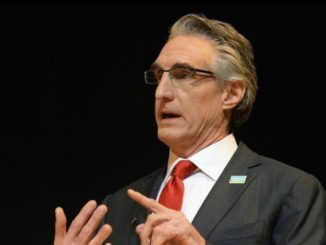
The 2020 Presidential Election — and its disputed outcome — has dominated media headlines for months now. Given the current state of things, don’t expect that to end any time soon. But while we all wait to see how the final days of Trump’s presidency plays out, there’s a bill set to be heard by the North Dakota Legislature that proposes changes to our own state’s Presidential Elector requirements. Changes that could potentially force electors to vote for dead candidates.
House Bill 1078 was submitted by the Judiciary Committee “At the request of the Commission on Uniform State Laws”. To better understand the context of how the legislation came to be, perhaps it’s best to understand the commission itself.
Brief History
North Dakota’s Commission on Uniform State Laws “promotes uniformity in state laws on those subjects where uniformity may be deemed desirable and practicable.” Among other stipulations, the 10-member commission is statutorily required to have one member each from the House and Senate. Most recently, that has been Rep. Lawrence Klemin (R – District 47) and Senator David Hogue (R – District 38).
Rep. Klemin and Senator Hogue are part of the umbrella organization known as the Uniform Law Commission (ULC). According to ULC’s website, the organization was “established in 1892, provides states with non-partisan, well-conceived and well-drafted legislation that brings clarity and stability to critical areas of state statutory law.”
Those wishing to be members of ULC “must be lawyers, qualified to practice law.” The organization consists of “practicing lawyers, judges, legislators and legislative staff and law professors, who have been appointed by state governments as well as the District of Columbia, Puerto Rico and the U.S. Virgin Islands to research, draft and promote enactment of uniform state laws in areas of state law where uniformity is desirable and practical.”
Members of the commission are required to attend annual meetings of the ULC.
House Bill 1078
On June 11, 2020, the North Dakota Commission on Uniform State Laws met and set its recommendations for the 2021 Legislative Session. According to this September 2020 document, prepared for the Judiciary Committee by Legislative Council, one of the five items on its list of recommendations is the “Faithful Presidential Electors Act”. (Note: Rep. Klemin is Chairman of both the North Dakota Commission on Uniform State Laws and the House Judiciary Committee.)
As described in that document:
“The Uniform Faithful Presidential Electors Act (UFPEA) provides a statutory remedy if a state presidential elector fails to vote in accordance with the voters of the elector’s state. The UFPEA has a state-administered pledge of faithfulness, with any attempt by an elector to submit a vote in violation of that pledge, effectively constituting resignation from the office of elector.”
In other words, the legislation now known as HB 1078 seeks to eliminate what is known as “faithless” presidential electors— those who choose to vote in the Electoral College for someone other than the winning candidates in the state’s General Election.
Historically, faithless electors haven’t changed the outcome of a presidential election. According to one source, this has only happened 156 times since our nation’s founding. But get this— “71 of these votes were changed because the original candidate died before the day on which the Electoral College cast their votes.”
And that’s the problem with HB 1078. It doesn’t provide an exemption in the event that the winners of a presidential election die before the Electoral College meets to cast their ballots. Nor does it address disability or things that might disqualify someone from being President or Vice President. Not only can you see this for yourself by reading the text of HB 1078, but ULC’s own document regarding the legislation admits as much:
“The Constitution is silent on a variety of other problems caused by deaths or, indeed, other sorts of arguably disqualifying developments. This is particularly notable in the period after election day but before the electors have met and voted… This Act does not deal with the possibilities of death, disability or disqualification of a presidential or vice-presidential candidate before the electoral college meetings.”
Isn’t this potentially problematic? Don’t get me wrong. I realize it’s not exactly common. But if lawmakers are indeed going to force our state’s electors to sign a pledge to specific candidates, shouldn’t there at least be some exceptions for unusual circumstances? Especially since the Constitution is silent on the issue?
(Note: If you’re interested, click here for a history of the 1872 election, in which a major candidate did die between Election Day and the meeting of the Electoral College.)
You might recall the spat District 8 Republicans recently had with Governor Doug Burgum, in the aftermath of one of their legislative candidates passing away prior to election day. Nominee David Andahl won the Primary Election to compete for a House seat in November, but passed away from COVID-19 after General Election ballots were mailed out by the Secretary of State’s office. It was a mess that the North Dakota Supreme Court ultimately ruled on. Why? Because state law didn’t exactly provide for such a unique situation.
With the Andahl situation so fresh in the minds of many, I would hope that the North Dakota Legislature will ensure that HB 1078 is amended or defeated. Failure to do so would be a horrible dereliction of duty. Passing a law that binds Presidential Electors to the point of having to vote for dead candidates is — in my mind — ridiculous. I don’t care how unusual it is.
This is the kind of “uniformity” that needs to be rejected.
(Editorial Note: While some may argue that the 20th Amendment covers this issue, it is my opinion that it does not. It is not the popular vote that elects our President and Vice President. It is the Electoral College. Therefore, a candidate cannot be an official “President-Elect” or “Vice-President Elect” until the electoral votes are cast and certified with the necessary majority.)
PLEASE LIKE & SHARE!
Sources:
- House Bill No. 1078 – Sixty-seventh Legislative Assembly of North Dakota – LC Number 21.0169.04000 (nd.gov)
- Commission on Uniform State Laws | North Dakota Legislative Branch (nd.gov)
- Overview – Uniform Law Commission (uniformlaws.org)
- Commission on Uniform State Laws | North Dakota Legislative Branch (nd.gov)
- 21.9394.01000.pdf (nd.gov)
- The Electoral College – “Faithless Electors” (fairvote.org)
- DownloadDocumentFile.ashx (uniformlaws.org)
- 1872 United States presidential election – Wikipedia
- Should Gov. Burgum Get to be Kingmaker in District 8? – The Minuteman Blog
- North Dakota Supreme Court issues opinion on filling the pending vacancy in the District 8 seat (valleynewslive.com)
- 20th Amendment – Presidential Term and Succession, Assembly of Congress | The National Constitution Center





